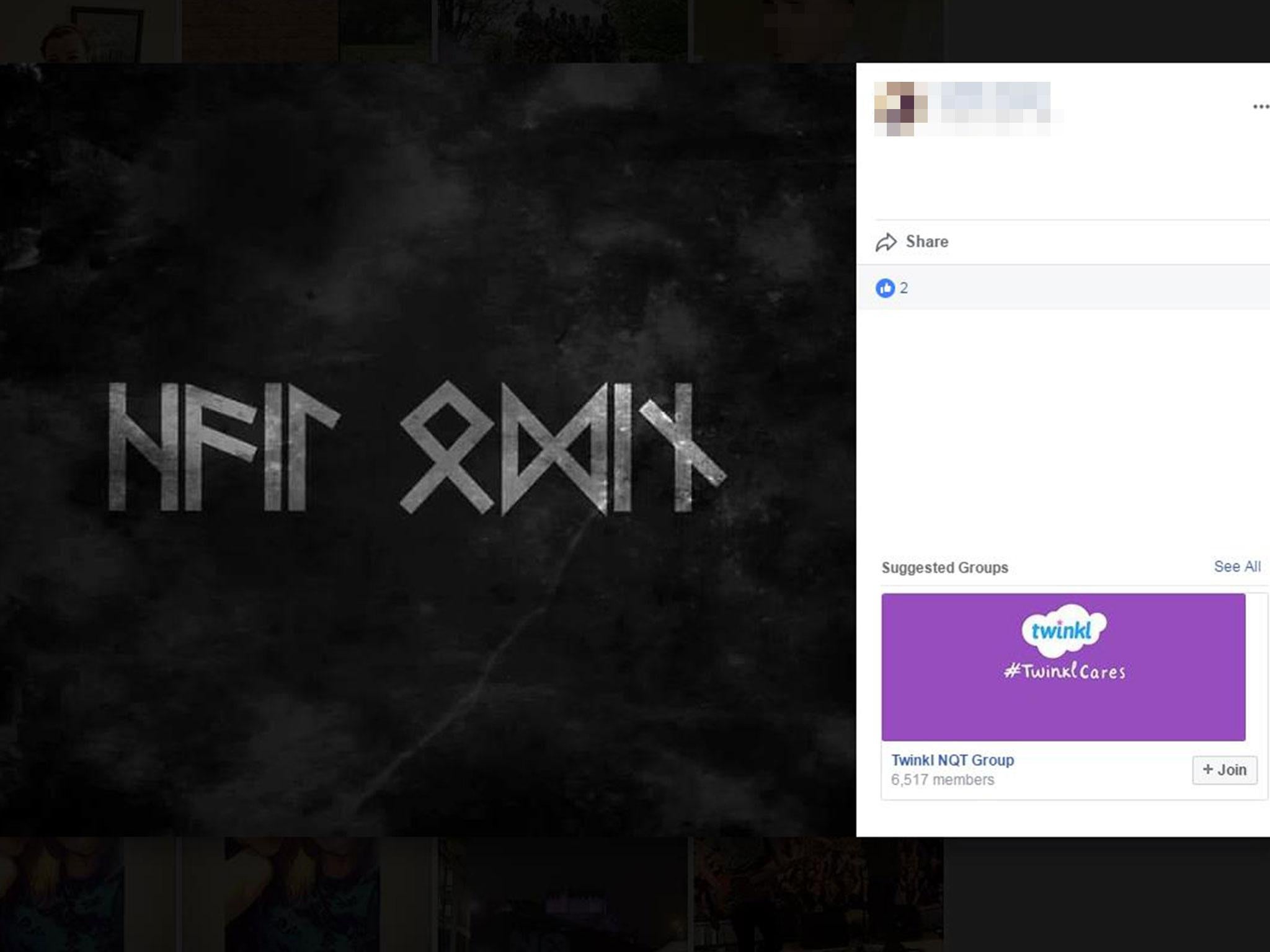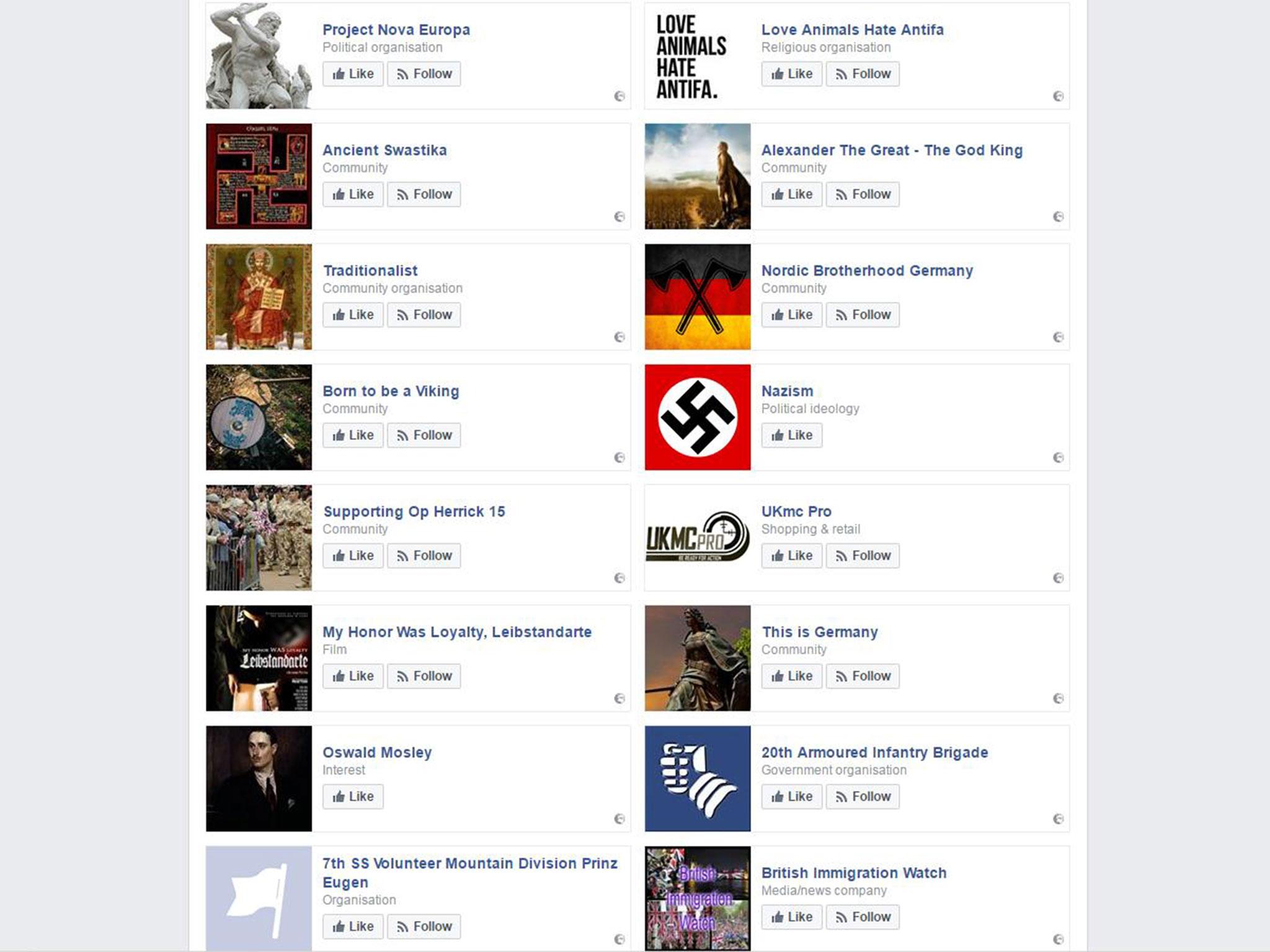British Army faces questions after recruiting soldier who 'liked' Nazism on Facebook
Exclusive: Calls for more stringent vetting amid fears far-right extremists are being accepted into the armed forces

Your support helps us to tell the story
From reproductive rights to climate change to Big Tech, The Independent is on the ground when the story is developing. Whether it's investigating the financials of Elon Musk's pro-Trump PAC or producing our latest documentary, 'The A Word', which shines a light on the American women fighting for reproductive rights, we know how important it is to parse out the facts from the messaging.
At such a critical moment in US history, we need reporters on the ground. Your donation allows us to keep sending journalists to speak to both sides of the story.
The Independent is trusted by Americans across the entire political spectrum. And unlike many other quality news outlets, we choose not to lock Americans out of our reporting and analysis with paywalls. We believe quality journalism should be available to everyone, paid for by those who can afford it.
Your support makes all the difference.The British Army is facing mounting questions over its vetting processes after clearing a soldier who “liked” Nazism on his public Facebook page.
The Scottish recruit, who is serving with the Royal Regiment of Scotland, is among several known troops who were accepted on basic training despite expressing neo-Nazi, racist and anti-Semitic views online.
The infantry soldier, who has a wife and young child, joined the Edinburgh-based regiment last year.
His Facebook page indicates a deep affinity with neo-Nazi and white supremacist ideology, formerly including a cover photo showing the phrase “Hail Odin” spelt out in runes.
The slogan has been taken up by far-right members including terrorist Anders Behring Breivik, who professed his religion as “Odinism” in an extremist manifesto before massacring 77 people in bombing and shooting attacks in Norway.
A group of anti-immigrant vigilantes calling themselves the Soldiers of Odin, who started in Finland, are among the groups “liked” on Facebook by the soldier.
Other pages listed on his profile include one simply entitled “Nazism”, the School of National Socialism, the Nazi Wehrmacht and Panzerwaffe, British fascist leader Oswald Mosely and Germany’s ultranationalist NPD party.

The soldier’s “likes” also show a strong interest in white supremacist ideology, including “ethno-nationalism”, the idea of an Aryan race and pages spreading antisemitic posts, Jewish conspiracy theories and Holocaust denial.
Steve Rose, from the Faith Matters counter-extremism group, said the “disturbing case” demonstrated the importance of understanding how extreme far-right and neo-Nazi ideas can spread openly online.
“We encourage the Ministry of Defence (MoD) to review how they analyse the social media pages of potential recruits to spot the signs of far-right radicalisation, and the evolving face of such hateful and racist ideologies,” he told The Independent.
Iman Atta, the director of the Islamophobia monitoring group Tell MAMA, said she was shocked that the soldier remained in active service.
“We have confidence in the army's vetting procedures but clearly more needs to be done and can be done,” she added.
“We hope that we can work closer with the armed forces in informing them about anti-Muslim rhetoric that may be indicators of far-right extremism.
"We need a review of the impacts of extremist material online and whether serving soldiers are coming across and potentially consuming this material which is widespread, particularly through groups like the English Defence League and others."

Ms Atta said extreme views were a particular concern in the armed forces because of the impact they could have on military engagements.
The soldier did not respond to The Independent’s request for comment.
He was exposed days after it emerged that a member of the neo-Nazi group National Action managed to join the army earlier this year, despite the organisation being banned as a far-right terrorist group.
Simon "Serj" Forster, who has since been discharged, assured friends his views were “not wavering” before deleting incriminating Facebook posts during his application process.
National Action members are continuing to operate under the cover of new names that allow them to evade authorities, and there are feared to be many more extremists in the armed forces.
A spokesperson for the Army said he could not comment on individual cases and would not confirm whether vettting processes are being reviewed.
“Extremist ideology is completely at odds with the values and ethos of the Armed Forces. The Armed Forces have robust measures in place to ensure those exhibiting extremist views are neither tolerated nor permitted to serve,” he added.
“All allegations of unacceptable behaviour are investigated and action taken as appropriate. For security reasons we cannot comment on our vetting process.”
In an unrelated court case, two soldiers and a civilian have appeared in court charged with terror offences and membership of National Action.
The Independent previously revealed that the MoD was treating the arrests, including soldiers based in Cyprus and Wales, as an isolated case and had no plans for a wider inquiry into concerns over extremism.
“Questions remain over whether the armed forces are consistently monitoring for extremist activity in their ranks,” said the Liberal Democrats’ Shadow Home Secretary, Ed Davey.
The Green Party warned that serving members of the armed forces are “vulnerable to recruitment” from far-right groups.
Co-leader Jonathan Bartley said: "The Government’s failure to launch an inquiry into extremism within the armed forces suggests it is afraid of what it will find.
“We must protect serving and retired personnel by providing training to spot the signs of radicalisation, and upping the support and mental healthcare provision available.”
David Hanson, a former crime and policing minister under the Labour government, also called for far-right groups to be dealt with alongside the threat from Islamist extremists in the wake of the terror attack in Finsbury Park, murder of Jo Cox and an attempted far-right beheading in Mold.
The number of suspected far-right extremists referred to the Government’s Channel counter-extremism programme has also risen dramatically in the past year, now making up almost a third of all those monitored.